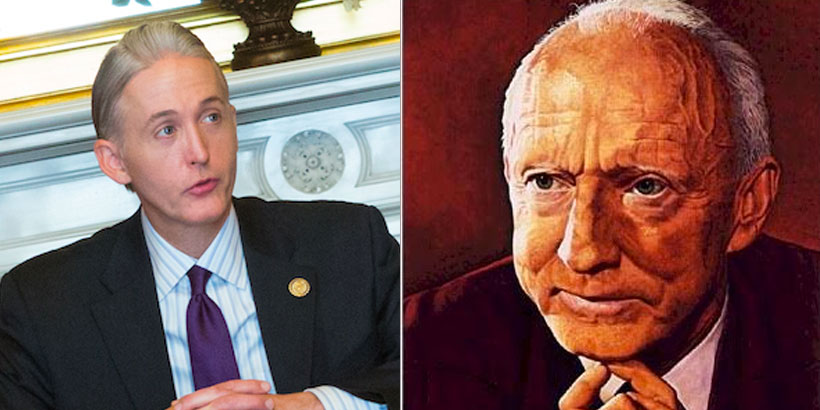
Trey Gowdy (R-SC) has already reached heights in his career in public service that many ambitious politicians could only dream of. He clerked for a state Supreme Court justice and a federal judge. He spent six years as an assistant U.S. attorney and a decade as a district attorney. He was then elected to Congress in the tea party wave of 2010, rose to prominence as one of that class’s fastest rising stars, then stepped into the national spotlight as the chairman of the Select Committee on Benghazi.
It’s that type of résumé that usually leads to an eventual run for U.S. Senate, or a move from the legislative branch to the executive branch, either with a run for governor or an appointment to a presidential cabinet post.
As Roll Call points out in a new piece discussing Gowdy’s career trajectory, “the path from the legislative to the executive branch is as well-worn as usual, with five senators and a former senator now hoping to succeed another onetime senator as president and 15 former members joining the Cabinets of the Obama and George Bush administrations.”
But individuals who are close to Gowdy say he is planning to take the road less traveled.
Not a single member of Congress has left the Capitol for a federal judicial appointment in the past three decades, and as Roll Call points out, “the last Supreme Court justice with any congressional experience retired in 1971.” It may take some time, but South Carolina’s most well-known conservative firebrand is hoping to buck the trend.
“I think he would tell you that the best job he’s ever had is being a prosecutor,” Gowdy’s South Carolina colleague Sen. Tim Scott told National Review last year. “I think I could change that if we were able to make him a federal judge. That would be the best job he’s ever had. And after he becomes a federal judge, I assume he’ll be a Supreme Court justice before he’s 65 or so.”
If Gowdy does aspire to go from his seat in Congress to the federal bench, he can look to the career path of Alabama’s only U.S. Supreme Court justice of the 20th century, Hugo Black, as a blueprint for how to get there.
Black, a University of Alabama-educated attorney from Ashland, was elected to the United States Senate in 1926. Similar to Gowdy in recent years, Black quickly earned a reputation for being a tireless worker and a dogged investigator. In his first high profile Senate probe, Black exposed fraud and collusion between Herbert Hoover’s administration and private airline owners in what was ultimately known as the “Air Mail scandal.” He later went after “high-powered, deceptive, telegram-fixing, letter-framing, Washington-visiting” lobbyists by pushing legislation forcing them to register their names and clients, a practice that continues to this day.
Black also became well-known for delivering forceful, passionate speeches on the Senate floor, a reputation that Gowdy has earned during his tenure in the House as well.
Black voted in favor of all 24 programs in President Franklin Roosevelt’s “New Deal,” prompting FDR to consider the Alabama senator for an opening on the U.S. Supreme Court in 1937. His persistent use of the Senate’s investigative role sealed the deal for the president, who nominated Black to succeed retiring justice Willis Van Devante. He was overwhelmingly confirmed by his colleagues by a vote of 63-16, served 34 years on the bench and is now considered in some circles to be among the most influential jurists of the 20th century.
Presidents have the authority to nominate federal judges in states all over the country, but typically seek the blessing of each state’s U.S. senators to ensure confirmation. The second part of that equation will be easy for Gowdy, whose two senators are Republicans. But just as Black had Roosevelt, Gowdy will need an ally in the White House for his judicial dreams to come true.
With next year’s presidential election, that time could come sooner rather than later.
“Two of the South Carolinians on the 4th U.S. Circuit Court of Appeals will become eligible for the semiretirement of senior status during the next presidential term, freeing up their seats,” explains Roll Call. “One rung down the pecking order, a pair of seats on the federal trial court in Gowdy’s state have been vacant and without nominees for more than a year, a situation that could well last through the election.”
Trey Gowdy’s conservative political views could not be more different from Hugo Black’s, who was a liberal Democrat his entire life. But we could look back several decades from now and find that their career trajectories were remarkably similar. As far as Gowdy’s concerned, that would be just fine by him.
RELATED: This Alabama college has produced the fourth most U.S. Supreme Court Justices
.@TGowdySC’s likely career switch is unusual, but follows in the footsteps of an Alabama icon https://t.co/hIlKV9DL7T
— Cliff Sims (@Cliff_Sims) November 16, 2015












